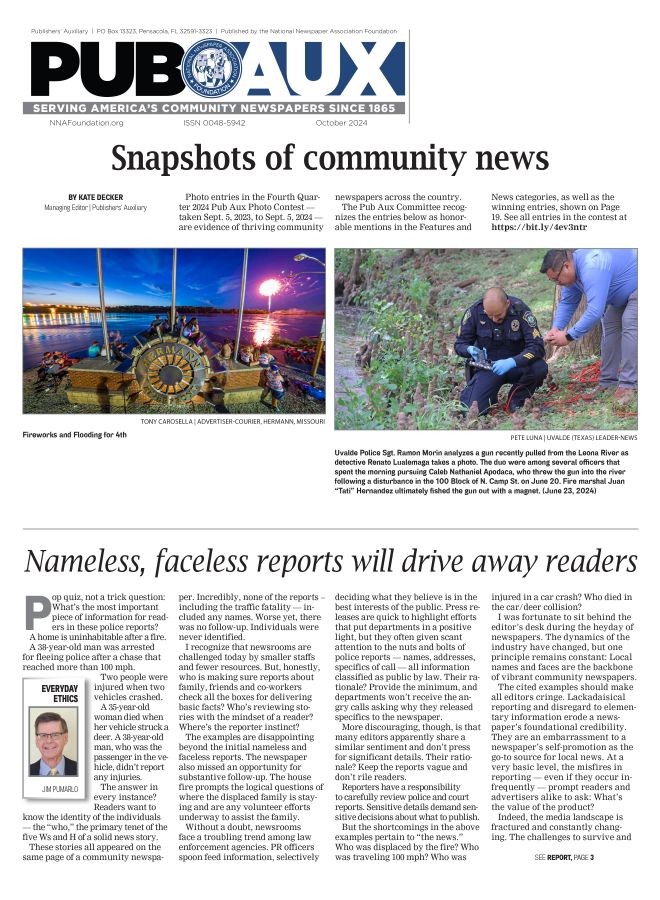Publishers urged to attend summit
Nov 28, 2012
Community newspaper executives across America are being asked to join a leadership summit March 14, called specifically to address critical problems with the U.S. Postal Service.
National Newspaper Association President Merle Baranczyk said the purpose of the summit would be to oppose the Postal Service’s recent decisions targeting newspaper advertising for diversion to direct mail and to discuss the future of newspaper delivery with senior postal officials.
Baranczyk, publisher of the Salida (CO) Mountain Mail, said, “The past year has brought us an epidemic of new problems with our nation’s postal administration.”
An agreement in August aimed directly at newspaper inserts through an agreement with Valassis Direct Mail simply capped a steady barrage of new issues coming from the ailing U.S. Postal Service.
Baranczyk said the NNA board of directors determined that it is time to bring industry leaders together to revisit newspapers’ partnership with USPS.
“We urge newspaper executives in every state to delegate a minimum of two industry leaders to attend this summit. We intend to invite the postmaster general and other policymakers to meet with us. Then we will visit our congressional delegations to communicate our concerns.”
Action by the 112th lame-duck Congress on postal reform legislation recommended by NNA is possible, he said.
“But what we are facing is beyond the capacity of one legislative patch,” Baranczyk said. “USPS’ financial woes are not going to go away. We need a reliable delivery service. Most urgently, we need the political arena to understand that if America wants the solid journalism that is the foundation of our democracy, we cannot have an institution of the federal government taking aim at newspapers in this manner.”
He cited a host of battles NNA has fought on behalf of community newspapers in 2011 and 2012:
• Suing the Postal Regulatory Commission for approving the Valassis deep postage discounts.
• Seeking fair accounting for the Every Door Direct Mail advertising program that targets smaller newspaper advertisers.
• Opposing new mandates for Intelligent Mail Barcodes, which would load expense onto newspapers’ mailing programs, while providing little benefit.
• Petitioning to keep the most efficient, smaller mail processing centers functioning for local newspaper mail.
• Asking for recognition of the value of newspapers entered into local post offices when the USPS administration considers closing them.
• Fighting to maintain Saturday mail delivery, where studies show that a slow down of service would not only harm weekend newspapers but also delay delivery of cash payments in the mail.
• Preserving service standards for in-market newspaper mail.
It adds up to one big picture, Baranczyk said.
“We’ve heard publishers say the Postal Service wants to stop delivering our newspapers and then go after our advertising. I believe the current problems are not as Machiavellian as that and are rather the symptoms of a deeply-ailing institution that has waited too long to address its costs and changing mail patterns.
“Regardless, the result is the same. It is time for us to come together as newspaper publishers—as we have done repeatedly during the past 100 years—to decide what we are going to do about this situation.”
NNA will conduct the Leadership Summit the morning of March 14 at the Crystal City Marriott in Arlington, VA. During the afternoon, delegations will visit their congressional offices to register their views with lawmakers. The evening will be devoted to the We Believe in Newspapers dinner sponsored by the National Newspaper Association Foundation.
Invitations to the summit will be sent in December, he said.
NNAF President Elizabeth Parker, executive editor and co-publisher of New Jersey Hills Media Inc. in Bernardsville, NJ, announced that March 14-15 would also be when NNAF starts its pilot program to train budding journalists in news literacy.
News literacy fellows will be selected to participate in a news gathering exercise under the mentoring of veteran community newspaper journalists. They will cover a current events story in Washington and work with their mentors to distinguish fact from opinion as they produce a story. Details on the program will be announced before the end of the year, she said.







